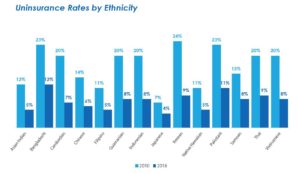What we do: APIAHF works to ensure that all Americans have access to health coverage and quality care that they can afford and rely on, no matter where they come from or what language they speak.
Health coverage is a strong predictor of access to health care in the U.S. Health coverage rates vary widely among Asian Americans, Native Hawaiians, and Pacific Islanders. As a group, Asian Americans, Native Hawaiians, and Pacific Islanders are more likely to be uninsured than non-Hispanic whites. Specific ethnic groups face extremely high rates of uninsurance: In 2016, 14% of Nepalese Americans, 12% of Micronesians and 9% of Laotians were uninsured.

REMAINING UNINSURED
Despite improvements through the Affordable Care Act, Medicaid and CHIP, disparities within AA and NHPI communities remain due to varying degrees of poverty, immigration-based barriers, lack of cultural competency in the health care system, and language access barriers.
Immigration status is a major social determinant of health, impacting the type of coverage a person is eligible for and whether that person can access routine and preventive care. As a result, many Asian Americans and Pacific Islanders are locked out of public programs due to federal and state immigration restrictions. Nationally, 35% of noncitizens are uninsured, compared to 8% of naturalized citizens and 7% of native-born citizens.
In addition, many Asian Americans, Native Hawaiians, and Pacific Islanders that qualify for public programs remain uninsured because of language and cultural barriers in the enrollment process, misinformation about eligibility, and other family hardships such as food and housing insecurity.
